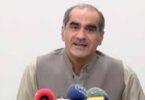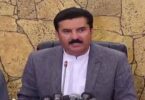F.P. Report
ISLAMABAD: Winding up the debate of budget session 2022-23 in the National Assembly, Finance Minister Miftah Ismail emphasised that Pakistan, the country of 220 million people, was not going to default in any shape, adding that it would rather head towards progress and development by the grace of Allah Almighty.
Speaking on the floor of the House, the finance minister said, “When we came, there were huge subsidies on petrol and diesel. I thank the leadership of the Pakistan Muslim League-Nawaz (PML-N) and other parties for strengthening my hands so that I could take some stringent measures for the betterment of the economy.”
He said that the leadership of all the other political parties were of the view that assuming power at the time of crisis was not in the favour of anyone; nevertheless, they preferred to assume the power to bring the country out of the economic crisis.
The finance minister said that the government abolished tax on cotton seed by introducing some changes in the budget, adding that the government saved the country from default and it also provided money to the farmers considering it an investment.
“The threat of default is now over, and the country is now on the track to development. The government has imposed tax on small and big shops. Our negotiations with the International Monetary Fund (IMF) are in the final phase,” claimed the finance minister, the government saved the country from going bankrupt by taking tough decisions.
Miftah Ismail also stated that Pakistan would soon become self-sufficient in the production of edible oil. “For the first time in the history of Pakistan, a farmer-friendly budget has been presented by this government,” he added.
He also alleged that former prime minister Imran Khan borrowed Rs20,000 billion as loans during the tenure of his government, adding that the current financial year would be difficult.
Elaborating the imposition of taxes by the government on different sectors, Miftah said that the government did not impose indirect taxes to keep the poor people safe from financial burden, adding that the government taxed big industries to reduce the budget deficit and avoid loans from the international financial institutions.
On the occasion, Miftah Ismail, in a light mood, requested the Speaker to give him credit for imposing high taxes on the factories of the sons of his own prime minister.
“My own company will give above Rs200 million in tax. The companies of the prime minister and his sons will also pay high taxes. If we are asking others to pay high taxes, we are doing the same too,” he pointed out.
The finance minister said that the government tried its best to facilities the people in the budget. “There are as many as nine million retail and wholesale shops in the country. We have devised a strategy to bring at least 2.5 million to 3.5 million of these shops under the tax network,” he added.
“Moreover, under a new scheme, their income tax and sales tax have been fixed to their electricity bills. A fixed tax of Rs3,000 from small shops and Rs10,000 from big shops will be received monthly from these shops with their electricity bills. After that, they will owe nothing to the Federal Board of Revenue (FBR),” he stated.
He said that there would be a fixed tax on the restaurants too, adding that the government had set a high target for tax collection.






